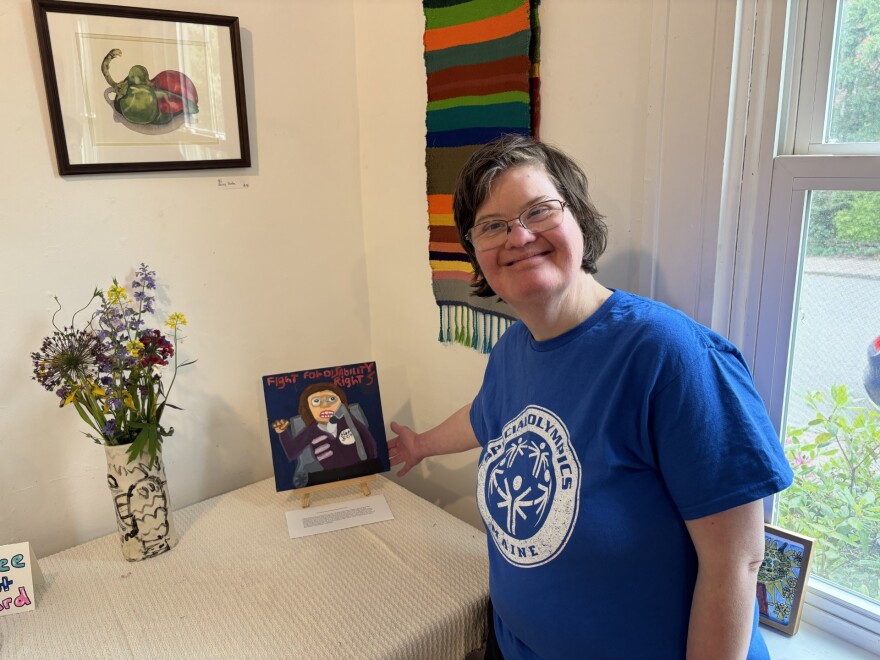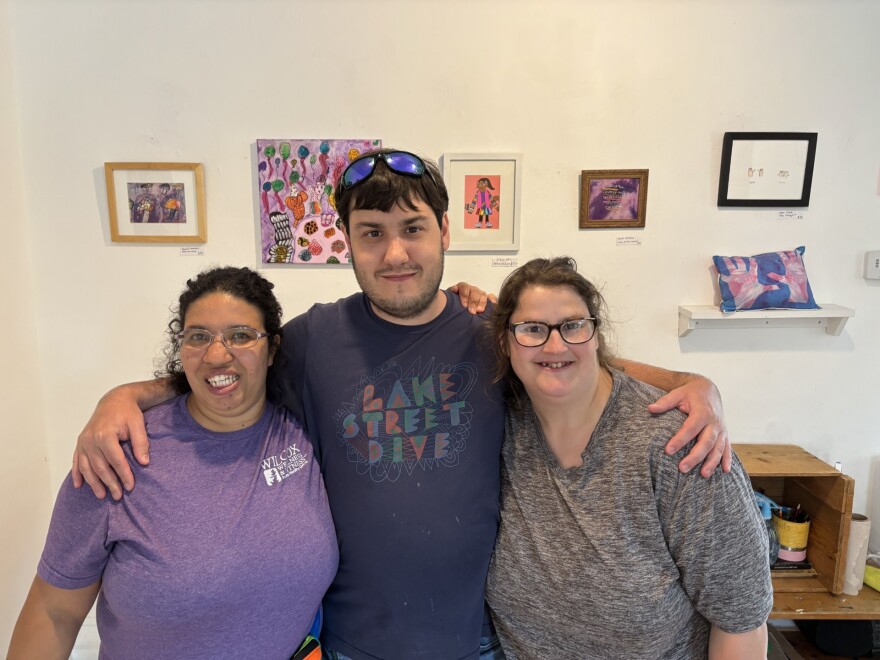It's opening night for a new show at Spindleworks Art Center in Brunswick, which serves people with intellectual disabilities and autism. And the artists here are eager to show their work.
Anna McDougal is especially proud of one of her paintings.
"It's about disability rights and diversity," she said.
McDougal painted her role model, Judith Heumann — an activist often referred to as the "mother" of the disability rights movement. The theme of this show is Diversity, Equity, and Inclusion. And that has special meaning for these artists, including McDougal. Growing up, she said, she didn't have much of a community. But she found it at Spindleworks. She's been coming here for more than 20 years.

"We just want to be included," McDougal said. "That's what inclusion is. Is to be accepted and be with people without disabilities."
Brian Braley is senior manager of Spindleworks.
"Really, we use art as a connection, to connect people to the community and to help them express themselves and be represented as artists," Braley said.
Spindleworks supports 60 artists between its location in Brunswick and another in Gardiner. And it's funded by Medicaid.
"I think what people don't realize is that Medicaid really does fund a whole host of services, not just medical needs," Braley said. "And you know, it's the only access that many of the people we have have to the community."
More than 38,000 adult Mainers with disabilities are enrolled in MaineCare, the state version of Medicaid. Advocates say the future of programs that help people with disabilities live in the community is at risk if Congress slashes hundreds of billions of dollars from Medicaid as proposed under the pending budget bill.
"I will say it's making us nervous," said Brett Bulmer, executive director of the Independence Association, which operates Spindleworks as well as home support services for roughly 350 people. All of the programs are funded by Medicaid, he said.
"It's making us very nervous," Bulmer said. "This could have a drastic impact on our services. And, you know, it scares me to think about what that might look like."
Laura Cordes, executive director of the Maine Association for Community Service Providers, is clear about what that would look like.
"We can't deliver services," she said. "We can't support a workforce without Medicaid or MaineCare reimbursements."
The association represents nearly 100 organizations that support people with intellectual disabilities, autism, and brain injuries. Services range from skill building, like how to prepare a meal or get ready for a job interview, to residential support. And while these programs aren't specifically targeted in the budget bill, Cordes said they would be affected by funding cuts.
"Any reduction in Medicaid funding to the states, even if not specifically directed at community-based disability services, will diminish the resources that each state receives, and will force states to reduce their Medicaid spending," Cordes said.
Which will further stress a system that's already fragile, she said. The organizations she represents serve 6000 adults, but 2000 more individuals are on waiting lists.
Kim Moody, executive director of Disability Rights Maine, said Medicaid is the foundation that allows people with disabilities to meaningfully participate in society.
"When Medicaid is threatened, the very existence of people with disabilities is threatened," she said.
"So I would say that probably the most frightening aspect of this bill is that it really looks to us, to disability advocates, that it's possible that with passage of this bill, people with disabilities will be moving back toward institutions," Moody said.
Spindleworks was actually born out of the deinstitutionalization movement in the 1970s, Brian Braley said.
"When people see the art first, the disability kind of disappears," he said. "So I feel like that's why we've been so successful, is people are able to see people for what they're capable of, and not the things that they can't do."

At the Spindleworks show opening, Sophie Jacobs and other artists said that they're worried they could lose support because of what happens in Congress. Jacobs said she comes here every day, to meet people, and create art that might make a difference.
"It's a good way to show, like, what we do to the world," Jacobs said. "To see if it changes what they decide to do."
The Congressional budget bill is now before the Senate. In a written statement, Republican Senator Susan Collins said that she's committed to protecting access to Medicaid and the services it provides for people with disabilities.



